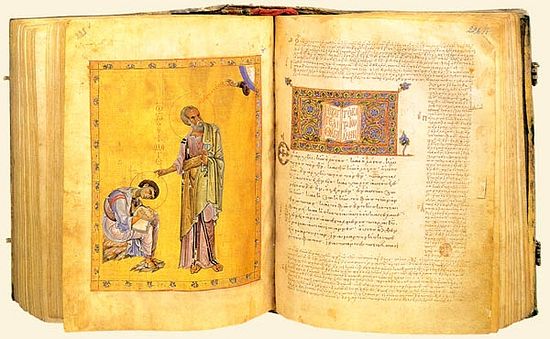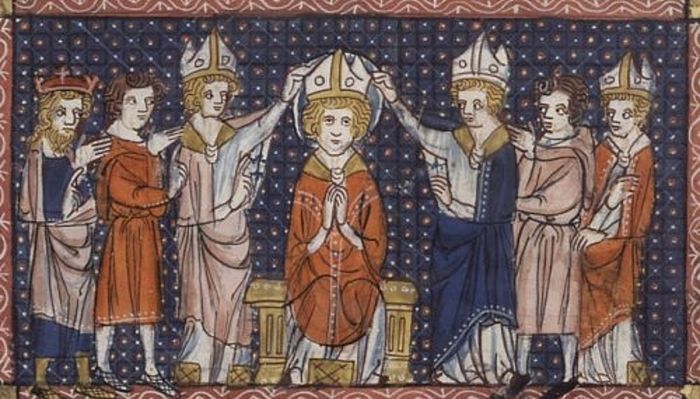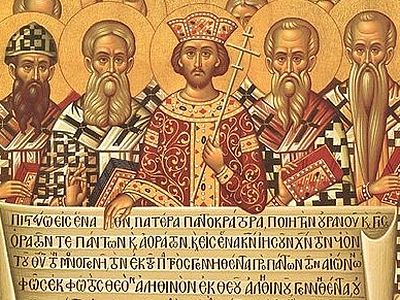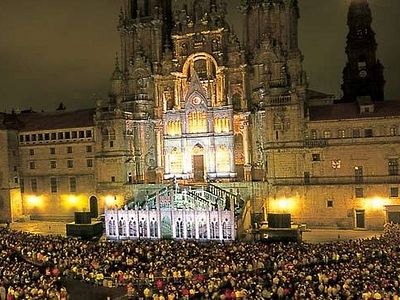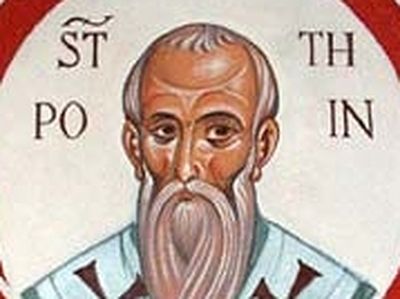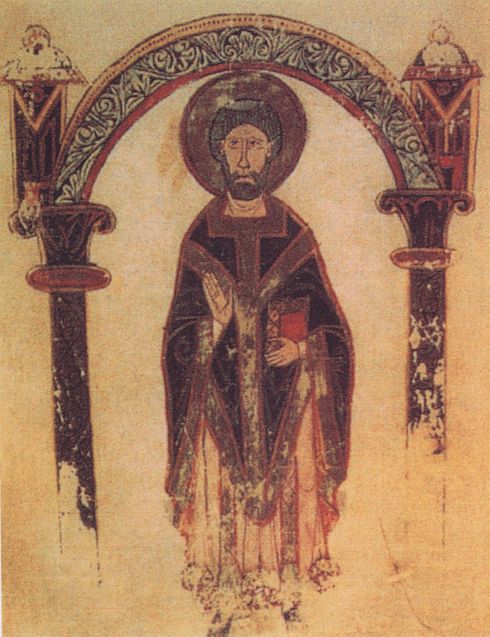
Our father among the saints Hilary of Poitiers was a leader in the West in the fight against Arianism in the fourth century. In this fight he was joined in the West by Sts. Ambrose of Milan and Martin of Tours. His popularity among the people of Poitiers was so great that he was elected bishop of Poitiers even though he was still married. During the course of the fight against Arianism his successes were mixed with setbacks, including being banished by the emperor for four years. He presented his position with many writings as he supported the "Homoiousians." His feast day is celebrated on January 13.
Life
Hilary was born into a family of pagans of distinction. Only approximate dates of both his birth and death are known. He was born near the turn of the third to fourth century in Poitiers. He received a good education which included—a rarity for his day in the West—knowledge of Greek. He studied the scriptures of the Old and New Testament which led to his leaving Neoplatonism for Christianity. With his wife and daughter, Apra, he was baptized in mid-life and received into the Church. His fame in Poitiers was such that the Christians unanimously elected him as their bishop at about 353.
These were the times when the Arian controversy was becoming intense in the Western Church. In his efforts against Arianism he fought to secure the excommunication of the Arian Saturtuinius as bishop of Arles as well as his two supporters, Uracius and Valens. He also wrote to Emperor Constantius II about the persecutions that the Arians were using against their opponents. His efforts received a setback when the Arian-dominated synod of 356 in Beziers, convened by Constantius, banished Hilary to Phrygia for almost four years for his strong defense of St. Athanasius of Alexandria. Hilary has often been referred to as "Athanasius of the West."
From exile he continued to lead his diocese. Also, he used this time to study the writing of the Eastern fathers and to write a number of dogmatic and polemical treatises presenting the Nicene position to the Arians, one of which, On the Trinity, was one of the first successful attempts to express the theological subtleties of the original Greek into the Latin. Hilary's agitation against the Arians while in exile resulted in the emperor ordering him back to Poitiers. He took his time returning, speaking along the way about the errors of the Arians. After his return from exile he continued actively challenging the Arians. In 359, Hilary attended a meeting of bishops at Seleucia in Isauria where he joined with Athanasius of Alexandria and the Homoiousians in a majority against the Arian party. Leaving Seleucia he continued to Constantinople to present the emperor with a petition setting out the arguments of the Trinitarians. His constant requests for public discussion with the Arian party, especially Ursacius and Valens, resulted in his being sent back to his diocese.
He spent the later years of his life writing. He was also noted for composing many hymns. He died in 367 at a date not known. He was held in highest regard, even during his time, as a Latin writer of the highest rank. St. Augustine of Hippo already was referring to him as "the illustrious doctor of the churches."
As a great bishop and teacher of the Church, St. Hilary bravely defended the Orthodox truth against the heresy of Arius who denied the full divinity of our Lord Jesus Christ. We offer below a sample of his teachings on this matter, and on many others that concerned the Church in his time. His words, penned, as they were, under the inspiration of the Holy Spirit, continue to inspire us today to remain firm in our confession of the Orthodox faith and to turn ever more to Christ our God in repentance:
* * *
On the Two Natures of Christ, Against the Heretic Arius
This is the true faith for human blessedness, to preach at once the Godhead and the manhood, to confess the Word and the flesh, neither forgetting God, because He is man, nor ignoring the flesh, because He is Word. (De Trinitate 9.3)
On the Incarnation
But the Incarnation is summed up in this, that the whole Son, that is, His manhood as well as His divinity, was permitted by the Father’s gracious favour to continue in the unity of the Father’s nature, and retained not only the powers of the divine nature, but also that nature’s self. For the object to be gained was that man might become god. But the assumed manhood could not in any wise abide in the unity of God, unless, through unity with God, it attained to unity with the nature of God. Then, since God the Word was in the nature of God, the Word made flesh would in its turn also be in the nature of God. Thus, if the flesh were united to the glory of the Word, the man Jesus Christ could abide in the glory of God the Father, and the Word made flesh could be restored to the unity of the Father’s nature, even as regards His manhood, since the assumed flesh had obtained the glory of the Word. Therefore the Father must reinstate the Word in His unity, that the offspring of His nature might again return to be glorified in Himself: for the unity had been infringed by the new dispensation, and could only be restored perfect as before if the Father glorified with Himself the flesh assumed by the Son. (On the Trinity 9.38)
On Holy Scripture
Scripture is not in the reading, but in the understanding. (Ad Constantium Aug. 2.9)
For there have risen many who have given to the plain words of Holy Writ some arbitrary interpretation of their own, instead of its true and only sense, and this in defiance of the clear meaning of words. Heresy liesin the sense assigned, not in the word written; the guilt is that of the expositor, not of the text. Is not truth indestructible? (On the Trinity 2.3)
…[T]hough we are not responsible for the words of Scripture, yet we shall have to render an account for the sense we have assigned to them. (On the Trinity 4.19)
On Theosis
It is therefore for the promotion of us, the assumed humanity that God shall be all in all. He Who was found in the form of a servant, though He was in the form of God, is now again to be confessed in the glory of God the Father: that is, without doubt He dwells in the form of God, in Whose glory He is to be confessed. All is therefore a dispensation only, and not a change of His nature; for He abides still in Him, in Whom He ever was. But there intervenes a new nature, which began in Him with His human birth, and so all that He obtains is on behalf of that nature which before was not God, since after the Mystery of the Dispensation God is all in all. It is, therefore, we who are the gainers, we who are promoted, for we shall be conformed to the glory of the body of God. Further the Only-begotten God, despite His human birth, is nothing less than God, Who is all in all. That subjection of the body, by which all that is fleshly in Him, is swallowed up into the spiritual nature, will make Him to be God and all in all, since He is Man also as well as God; and His humanity which advances towards this goal is ours also. We shall be promoted to a glory conformable to that of Him Who became Man for us, being renewed unto the knowledge of God, and created again in the image of the Creator, as the Apostle says, Having put off the old man with his doings, and put on the new man, which is being renewed unto the knowledge of God, after the image of Him that created him. (Col. 3:9-10) Thus is man made the perfect image of God. For, being conformed to the glory of the body of God, he is exalted to the image of the Creator, after the pattern assigned to the first man. Leaving sin and the old man behind, he is made a new man unto the knowledge of God, and arrives at the perfection of his constitution, since through the knowledge of his God he becomes the perfect image of God. Through godliness he is promoted to immortality, through immortality he shall live forever as the image of his Creator. (On the Trinity 11.49)
On False Teachers
But though many may heap up teachers according to their desires, and banish sound doctrine, yet from the company of the Saints the preaching of truth can never be exiled. From our exile we shall speak by these our writings, and the Word of God which cannot be bound will run unhindered, warning us of this time which the Apostle prophesied. For when men show themselves impatient of the true message, and heap up teachers according to their own human desires, we can no longer doubt about the times, but know that while the preachers of sound doctrine are banished truth is banished too. We do not complain of the times: we rejoice rather, that iniquity has revealed itself in this our exile, when, unable to endure the truth, it banishes the preachers of sound doctrine, that it may heap up for itself teachers after its own desires. We glory in our exile, and rejoice in the Lord that in our person the Apostle’s prophecy should be fulfilled. (On the Trinity 10.4)
On the Eucharist
The words in which we speak of the things of God must be used in no mere human and worldly sense, nor must the perverseness of an alien and impious interpretation be extorted from the soundness of heavenly words by any violent and headstrong preaching. Let us read what is written, let us understand what we read, and then fulfil the demands of a perfect faith. For as to what we say concerning the reality of Christ’s nature within us, unless we have been taught by Him, our words are foolish and impious. For He says Himself, My flesh is meat indeed, and My blood is drink indeed. He that eats My flesh and drinks My blood abides in Me, and I in him. (Jn. 6:55-56)As to the verity of the flesh and blood there is no room left for doubt. For now both from the declaration of theLord Himself and our own faith, it is verily flesh and verily blood. And these when eaten and drunk, bring it to pass that both we are in Christ and Christ in us. Is not this true? Yet they who affirm that Christ Jesus is not truly God are welcome to find it false. He therefore Himself is in us through the flesh and we in Him, while together with Him our own selves are in God. (On the Trinity 8.14)
On Theologizing with Words
[T]he errors of heretics and blasphemers force us to deal with unlawful matters, to scale perilous heights, to speak unutterable words, to trespass on forbidden ground. Faith ought in silence to fulfill the commandments…but we must strain the poor resources of our language to express thoughts too great for words. The error of others compels us to err in daring to embody in human terms truths which ought to be hidden in the silent veneration of the heart. (On the Trinity 2.2)
On the Cross of Christ
Yet, I suppose, you will arm yourself also for your godless contention with these words of the Lord, My God, My God, why have You forsaken Me ? Perhaps you think that after the disgrace of the cross, the favour of His Father’s help departed from Him, and hence His cry that He was left alone in His weakness. But if you regard the contempt, the weakness, the cross of Christ as a disgrace, you should remember His words, Verily I say unto you, From henceforth you shall see the Son of Man sitting at the right hand of power, and coming with the clouds of Heaven.
But, they say, the cross was a dishonour to Him; yet it is because of the cross that we can now see the Son of Man sitting on the right hand of power, that He Who was born man of the womb of the Virgin has returned in His Majesty with the clouds of heaven. Your irreverence blinds you to the natural relations of cause and event: not only does the spirit of godlessness and error, with which you are filled, hide from your understanding the mystery of faith, but the obtuseness of heresy drags you below the level of ordinary human intelligence. For it stands to reason that whatever we fear, we avoid: that a weak nature is a prey to terror by its very feebleness: that whatever feels pain possesses a nature always liable to pain: that whatever dishonours is always a degradation. On what reasonable principle, then, do you hold that our Lord Jesus Christ feared that towards which He pressed: or awed the brave, yet trembled Himself with weakness: or stopped the pain of wounds, yet felt the pain of His own: or was dishonoured by the degradation of the cross, yet through the cross sat down by God on high, and returned to His Kingdom? (On the Trinity 10.31,33)
On the Communion of Saints
To those who wish to stand [in God’s grace], neither the guardianship of saints nor the defenses of angels are wanting. (Commentary on the Psalms 124:5:6)
On the Swiftness of Creation
For although, as Moses teaches, each act of creation had its proper order;-the making the firmament solid, the laying bare of the dry land, the gathering together of the sea, the ordering of the stars, the generation by the waters and the earth when they brought forth living creatures out of themselves; yet the creation of the heaven and earth and other elements is not separated by the slightest interval in God's working, since their preparation had been completed in like infinity of eternity in the counsel of God. (On the Trinity 12.40)
Quotes taken from Classical Christianity
